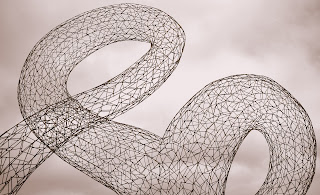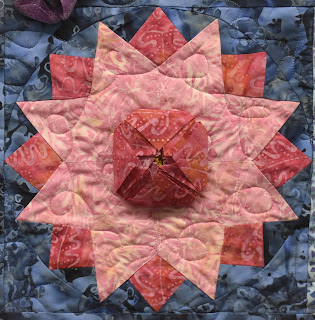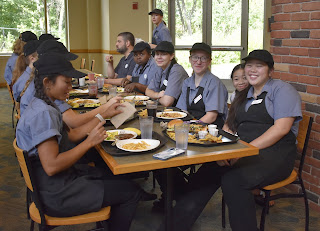Recently I read Deliberate Acts of Kindness by Meredith Gould.
The author examined how service is a spiritual practice. Below are some points from the book that I found interesting:
Eight Degrees of Tzedakah
1. To give grudgingly, reluctantly, or wit hregret;
2. To give less than one should, but with grace;
3. To give what one should, but only after being asked;
4. To give before one is asked;
5. To give without knowing who will receive it, although the recipient knows the identity of the giver;
6. To give without making known one's identity;
7. To give so that neither giver nor receiver knows the identity of the others;
8. To help another to become self-supporting, by means of a gift, a loan, or by finding employment for the one in need.
"Faith by itself, if it is not accompanied by action, is dead," wrote James in an epistle to members of the early church.
Buddhists...practice generosity, morality, renunciation, patience, truthfulness, determination, loving-kindness, and evenmindedness.
List what you think are totally perfect ways for you to serve, letting reason and logic dictate your choices.
Ask yourself: "What sort of person would I like to become?"
"Fill yourselves first and then only will you be able to give to others." St. Augustine
Maslow's Hierarchy of Needs
- LEVEL 1 - Physiological Needs - air, water, food, clothing, shelter, sleep
- LEVEL 2 - Safety and Security Needs - order, stability, certainty, routine, familiarity, protection from fear and disease, physical safety, economic security, freedom from threat
- LEVEL 3 - Social Needs - love, acceptance, belonging, affection
- LEVEL 4 - Esteem Needs - respect and recognition from others, self-respect, a sense of prestige
- LEVEL 5 - Self-Actualization Needs - peak experiences, fulfilling a sense of self and calling, opportunities for learning and creating at higher levels
Grant us ears to hear,
Eyes to see,
Wills to obey,
Hearts to love;
Then declare what you will,
Reveal what you will,
Command what you will,
Demand what you will.
- Christina Rossetti
While it may seem only logical to serve the homeless if you've been homeless, counsel battered women if you've been one, or to do hospice work if you've watched a loved one die without dignity, you may not be emotionally ready to serve in these ways.
As you behold evidence of tragedy, waste, abuse, and simple ignorance in people's lives get into the habit of asking yourself: What would make a difference? How could I make a difference?
Combine service work for others with R&R for yourself by looking into volunteer gigs at museums, theaters, concert halls, nature preserves, or community playgrounds.
"The way you begin to change the world is through service." Martin Luther King, Jr.
The Gig is Right for You If...
- You not only respect but like people in charge - their values, dedication, and human decency.
- You feel immediately at home with other volunteers, sensing they're exactly the kind of folk with whom you want to spend time.
- You experience a sense of satisfaction despite whatever frustrations and disappointments quickly - or gradually - emerge.
The Gig is Wrong for You If...
- You feel entirely too overwhelmed by the enormity of what needs to be done.
- You can't help but notice that everyone is a heck of a lot nicer to those being served than they are to anyone on the volunteer staff.
- You not only start dreading the prospect of showing up, but you unconsciously - or consciously - act out by arriving late or calling in sick or too busy.
"Charity begins at home." - Terence
Agree to serve on a trial basis. Establish a mutually acceptable period of time to check out the setting, staff, and other volunteers. Committing to at least one month and preferably three will give you - and them - an opportunity to experience the match.
Do all the good you can,
by all the means you can,
in all the ways you can,
in all the places you can,
all the times you can,
to all the people you can,
as long as you can.
- John Wesley
Start a prayer journal when you begin a new type or place of service. Note what you're being called upon to do and record any thoughts, feelings, and attitudes that emerge as a result.
Lord, make me an instrument of your peace.
Where there is hatred, let me sow love,
Where there is injury, pardon;
Where there is doubt, faith;
Where there is despair, hope;
Where there is darkness, light;
Where there is sadness, joy.
O divine Master, Grant that I may not so much seek
To be consoled, as to console,
To be understood, as to understand,
To be loved, as to love,
For it is in giving that we receive;
It is in pardoning that we are pardoned;
It is in dying that we are born to eternal life.
- St. Francis of Assisi
"Compassion is the only source of energy that is useful and safe." Thich Nhat Hanh
Model loving self-care by canceling your appearance and staying home when you have a splitting headache, drippy nose, moist cough, or fever. One of your gifts to the world should not be your germs. Showing up sick is not heroic, it's inconsiderate.
If you can't seem to arrive on time, something else - like resistance - is going on. Maybe you're in the wrong environment entirely.
You were led to the perfect place to doing as well as being, and now you're deep into wondering: "Is it still God's grace if I hate it?" What happened? This divinely inspired service gig is not the slightest bit illuminating, it's more heart-hardening than opening, and for sure you are not having fun. Unfortunately, you're also beginning to love watching lots of incredibly stupid TV because it takes your mind off the nonsense that goes on in the name of serving others. You're feeling lousy physically, never fully able to share the dull headache...Welcome to the shadow side of service.
Every six months, take the time to reassess what you are doing and where.
Boundaries are the limitations you set on what you perceive as insensitive behavior coming from others. The more firm the boundary, the greater your protection.
Establish a healthy separation between private and public worlds by creating a ritual to mark your entrance into and departure from service situations.
"We must be the change we wish to see in the world." Gandhi
Do not underestimate the stress of being around a lot of noise from people, equipment, traffic, and natural disasters. The best antidote to noise is silence. Make sure you eliminate or at least significantly reduce all aural stimulation as soon as you can. Listen to soothing music on your way home. Once home, turn the phone, television, and other noise off. You need a period of silent "down time" to calm body, soul, and spirit after a tough day of giving.










































































